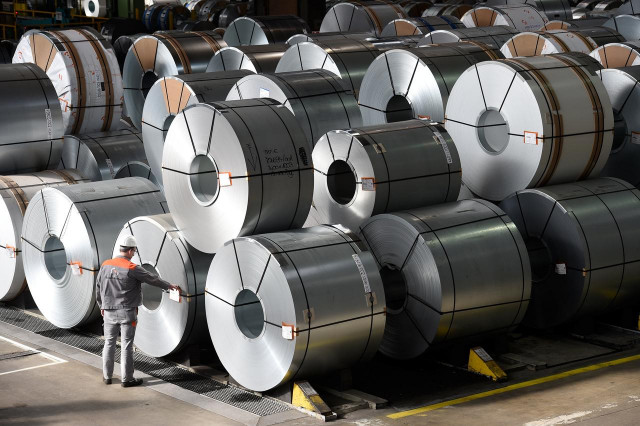PTI govt denounced for delay in PSM revival plan
Senate panel notes one cabinet member is facilitating steel scrap smuggling

Representational image. PHOTO: REUTERS
The Senate Standing Committee on Industries and Production, which met at the Parliament House on Monday, noted that a cabinet member was facilitating the smuggling of steel scrap from Iran for its use in re-rolling mills.
“This is most unfortunate that the lethargic approach (on the part of government) is not only protecting the steel mafia, but the delay in the revival plan is also increasing liabilities of PSM, making it further less attractive for the investors,” remarked Committee Chairman Senator Ahmed Khan.
A group of PSM stakeholders told the committee that the Ministry of Industries and Federal Board of Revenue (FBR) were not interested in resolving the matter.
Adviser to Prime Minister on Industries and Production Abdul Razak Dawood and Adviser to PM on Poverty Alleviation Dr Sania Nishtar faced a host of queries about how to improve the performance of government entities.
“We know mafia-like groups are importing steel scrap through under-invoicing; a solution is to take a policy decision and allow all imports through PSM only; this will regulate imports and even the business of re-rolling mills will be documented,” the committee chairman suggested. “This way, PSM will at least earn something.”
The committee was informed that financial advisers for PSM would be appointed soon, who would suggest ways of inviting a strategic investor for running the steel mill. At present, PSM’s deficit stands at Rs510 billion, of which Rs40 billion was added in the past 14 months.
The committee was informed that total liabilities of PSM in terms of pensions and gratuity of retired employees amounted to around Rs15.8 billion.
Panel members criticised the financial management on the part of Ministry of Industries and Production as well as finance ministry. “You can raise Rs5 billion through banks by pledging the steel products and scrap already present in PSM,” the committee chairman said. “This way we can clear some of the liabilities, but the finance ministry’s plan of clearing dues of pensioners in three to five years is like waiting to see them leave this world.”
Committee member Senator Kalsoom Parveen said things had been revolving in a circle since 2005 when PSM was privatised first. “Now, in 2019 we are still discussing the uncertain future of PSM; at least this government should come up with an idea,” she said.
The standing committee also discussed the proposal of developing coordination between the Benazir Income Support Programme (BISP) and utility stores.
Dr Sania Nishtar said the BISP had registered 5.2 million women in its network, who were paid Rs5,000 every quarter. Committee members suggested that out of the Rs5,000 disbursed in a quarter, Rs2,000 worth of vouchers may be distributed among the registered people, which could use them for the purchase of goods from the utility stores.
“This will prevent any misuse of cash, say on smoking etc, and will also help another state-owned venture with higher sales,” the committee chairman pointed out.
However, Sania Nishtar said different households had different expenditure requirements and fixing grocery purchases through USC was not viable.
“After working for around 10 months, the BISP has adopted a work plan that involves payments through banks and now after adopting this framework it is difficult to backtrack and engage in some arrangement with the utility stores,” she added.
However, the committee members insisted that mechanisms could be revised for good.
The committee also took up the rise in sugar prices by the cartel of millers. FBR officials said the impact of increase in general sales tax had been worked out at Rs3.50 per kg but the millers increased prices in the range of Rs15 to Rs30 per kg.
Sugar prices had been at Rs45 per kg but they had now gone up to Rs80 per kg, the meeting was told.
The matter of waiving Public Procurement Regulatory Authority (PPRA) rules for the procurement of commodities by USC was also taken up. The PPRA director-general revealed that a draft had been finalised to amend PPRA rules.
He said it was proposed to set a three-year framework for procuring commodities rather than bypassing the PPRA rules to ensure transparency in procurement.
Published in The Express Tribune, October 22nd, 2019.
Like Business on Facebook, follow @TribuneBiz on Twitter to stay informed and join in the conversation.



1733130350-0/Untitled-design-(76)1733130350-0-208x130.webp)















COMMENTS
Comments are moderated and generally will be posted if they are on-topic and not abusive.
For more information, please see our Comments FAQ